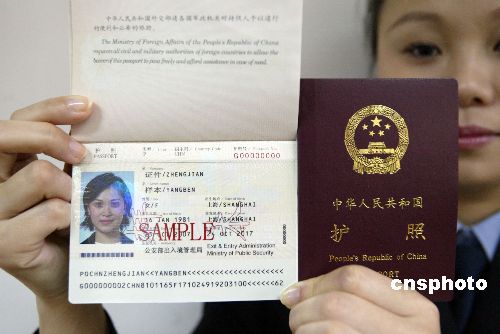
16 Jan, 2014
China moving to grow bilateral visa-free travel pacts
Beijing, (People’s Daily Online), January 15, 2014 – All of us like things to be simple when we travel, but Chinese citizens normally need to spend months preparing lots of documents and doing some serious leg-work in terms of organizing their paperwork ahead of their overseas holidays. Now here is the good news: China is trying to make its passport more valuable and to reach an agreement for visa-free travel with many other countries.
“China hopes to sign mutual agreements with as many countries as possible, which will allow Chinese nationals holding Chinese passports to enjoy quicker and more convenient overseas travel,” said Chinese Foreign Minister Wang Yi during his visit to France in October last year.
 |
| (Photo/ CNS) |
“Visas are the key issue to the development of Chinese tourism,” says Xia Lingen, professor of Fudan University, who specializes in the tourism industry. “Cumbersome visa procedures result in many Chinese would-be travelers looking elsewhere.”
Traveler says visa interview is harder than job interview
“This is my second time here.” Wang Hua gave a forced smile outside the visa application center of the American consulate-general in Shanghai. It was her first attempt to travel overseas, to visit her aunt in Los Angles. “I forgot to prepare some documents required for the application because I didn’t know the procedures.” Wang opened her briefcase to show her passport, application form, property certificate, travel plan statement, ID card, personal resume, and other necessary documents.
“I booked an interview one month in advance,” added Wang. “I arrived for my interview 30 minutes early because I knew I would have to queue for a while. Also my English is not particularly good, so I wanted to make a good impression to get a good interview score. I felt more nervous in the visa interview than during my job interview.”
“The success rate for American visa applications is over 90% in recent years,” says Gu Xiaolong, visa case officer of the American general consulate in Shanghai. “American visa application centers in China process 1.5 million visas a year for Chinese citizens. With increasing numbers of Chinese travelers, we have expanded our offices and simplified the visa procedures, removed the booking fee, and shortened the visa processing lead time to 10 working days. My view is that if the applicant is honest and well prepared they will secure their visa without difficulties.”
Hoping to increase the worth of a Chinese passport
The Henley & Partners Visa Restrictions Index is a global ranking of countries according to the extent of travel freedom enjoyed by their citizens. The top index score of 173 means that a Finnish passport holder, for example, may enter 173 countries and territories without a visa. It is an indication of how much room for improvement there is for the Chinese passport.
Good to know that China is making an effort.
According to Chinese Foreign Minister Wang Yi: “China has set up 35 visa application service centers in 15 countries across the four continents; we will continue to improve the quality of services in the long-term.”
China and Thailand agreed on mutual visa-free entry during Chinese Premier Li Keqiang’s visit to Thailand in October last year. As a result, travel between China and Thailand is likely to become much easier. Li has sent out signals inviting bilateral visa exemptions between China and Thailand, saying it will make things much more convenient for Chinese and Thai tourists. Chinese travelers are looking forward to the prospect.
British Culture Secretary Maria Miller launched the China Welcome initiative to make Britain the most welcoming destination in Europe for Chinese visitors last year; the Britain Tourism Bureau is also looking to place more qualified Mandarin-speaking guides and staff in airports, tourist attractions, hotels, and shopping malls, to ensure that Britain competes effectively for the market. “Britain is very much open for business, and this is just the beginning,” Maria Miller said.
A draft law prepared by the Russian Foreign Ministry was submitted to the State Duma on January 4 2014, aiming to ratify a Sino-Russian agreement which establishes more favorable conditions for developing and enhancing contacts between the citizens of both countries, primarily for business, science, culture and sports purposes. The agreement stipulates 30 days of visa-free travel for special passports holders in addition to currently enforced visa-free travel for diplomatic passport holders.



Liked this article? Share it!